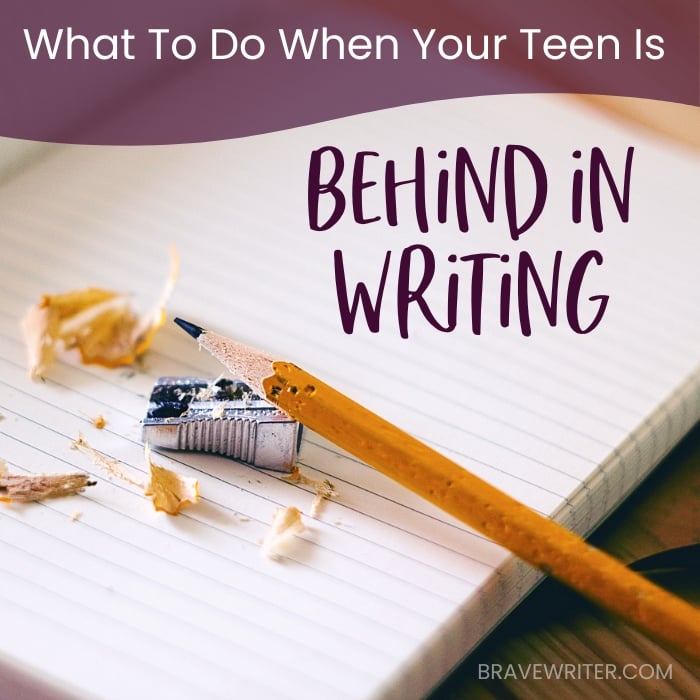
It’s downright scary when your child turns 16 and still can’t write (or won’t write or hates writing or avoids writing). Panic sets in and moms respond in one of two ways:
- they clamp down and expect more writing
- or they give up and close their eyes to the problem hoping it will get fixed later, in college.
These are two totally understandable approaches to the realization that your teen is still not writing well and college is only two years away.
I want to offer you a third approach:
Start over.
Before I share what I mean by starting over, read the following list to determine if your teen is behind in writing (I use masculine pronouns because far more male teens struggle with writing than females, but this list applies to everyone):
- No writing program you’ve used has ever worked for him.
- He hates holding a pencil and avoids any work that requires handwriting.
- He still finds spelling a challenge and misspells homonyms and easy words regularly.
- You face a “big scene” whenever you give feedback or try to help him write.
- His writing is unclear, doesn’t develop logically, and sounds like a second grader wrote it, not a soon-to-be adult.
- His thoughts are undeveloped and his writing doesn’t show the extent of his verbal vocabulary.
- He has never written more than a paragraph or two and has no idea how to write an essay or any format beyond freewriting.
- He is unskilled in punctuation even though you’ve taught him how to punctuate.
- He seems to understand the instructions while you talk with him, but he goes completely blank once you leave and can’t remember what he was supposed to write once you leave him to work on his own.
- He can’t keep his ideas in his head while he is writing them down. The pencil “makes” the thoughts “disappear.”
- He must have supervision while he writes or he will wander off to do something else.
- He needs leading questions in order to write.
If your child exhibits more than half of these symptoms, you have a delayed writer on your hands. You may also have a teen with a language processing disorder. I want to talk about the difference between the two.
For teens who are simply delayed in writing, it’s possible to get back on track and quickly. As I stated above, you’ll want to start over. You’ll need to let your teen know that what you’ve done to the present point has not worked.
How to Wipe the Slate Clean
In order to do so, you need to enlist your teen’s interest in becoming a competent writer. There’s not a lot that can be done if your teen is unconvinced of writing’s importance to his future.
Once you have a willing teen, I recommend beginning with the “Jot it Down” phase of writing. You’ll jot down your teens thoughts as he’s thinking them and expressing them verbally. You’ll begin with his areas of expertise and interest rather than typical “school” topics. Your goal is to foster writing skills (the skill called “dredging up words from inside to commit to paper”), not to master subject matter. So separate those goals right off the bat.
As you write out his thoughts for him, you’ll go back to the writing together to do the revising and editing. Talk about the writing, talk about ways to improve it, talk about how to reorganize it so that it makes more impact.
Do it all together.
Stick to topics of interest while you work through this phase.
You will follow the stages of development in order starting from the beginning. If you do this, your teen will move more quickly through the stages of growth because of his age and maturity and can (believe it or not) reach a level of high school competence in just two short years.
If you follow these steps, however, and you discover that your child makes no progress or continues to become frustrated by the mechanics of writing combined with the generative thinking required, I strongly urge you to get learning disability testing.
Don’t wait.
Auditory and language processing disorders don’t always show up in full strength until high school when mom takes more of a background role in home education and the teen is now responsible for proactive work. (Incidentally, my own son, who is 19 and in college, gets accommodations from the learning center at his university. Knowing in advance means you can look at colleges that are supportive of students with learning issues so that your young adult has a successful experience!)
Yesterday I attended the wedding of one of my first teen students. Seven years ago, he was sixteen and not writing. His mother came to me desperate to overcome his writing struggles. We began at the very beginning. Her son was cooperative and worked hard. Within two years, he became a competent (though not brilliant) writer. By the time he finished college, he wound up earning A’s in his writing classes. Knock my socks off!
It can be done.
Your teen can overcome years of frustration one step at a time with love and support. And if he is fighting a disability, find out so that he can get the kind of support that will make him successful.


















